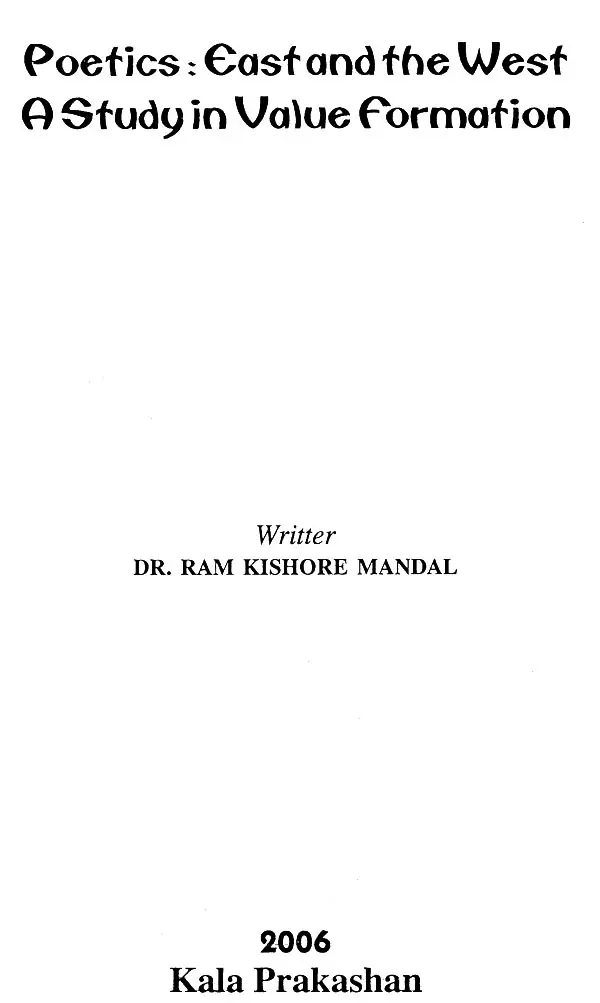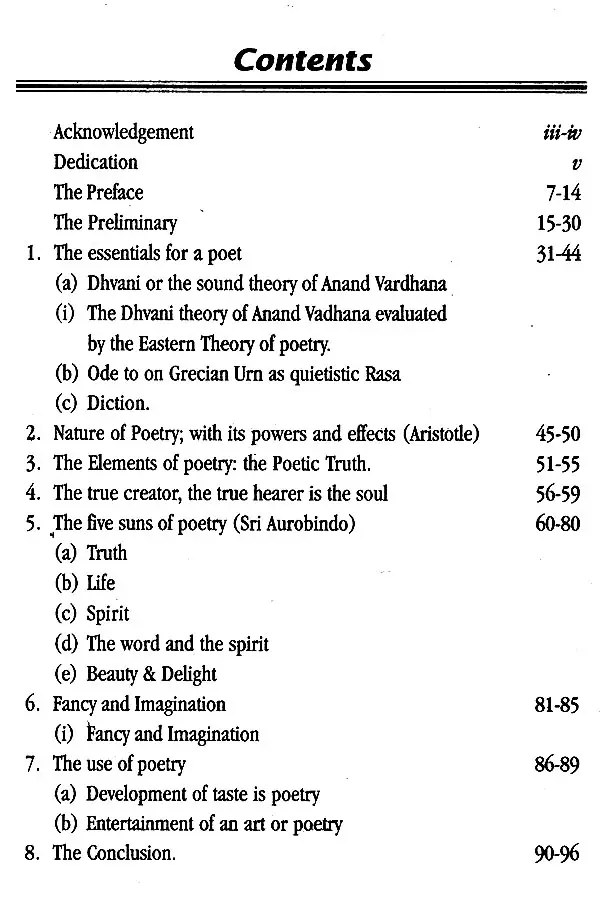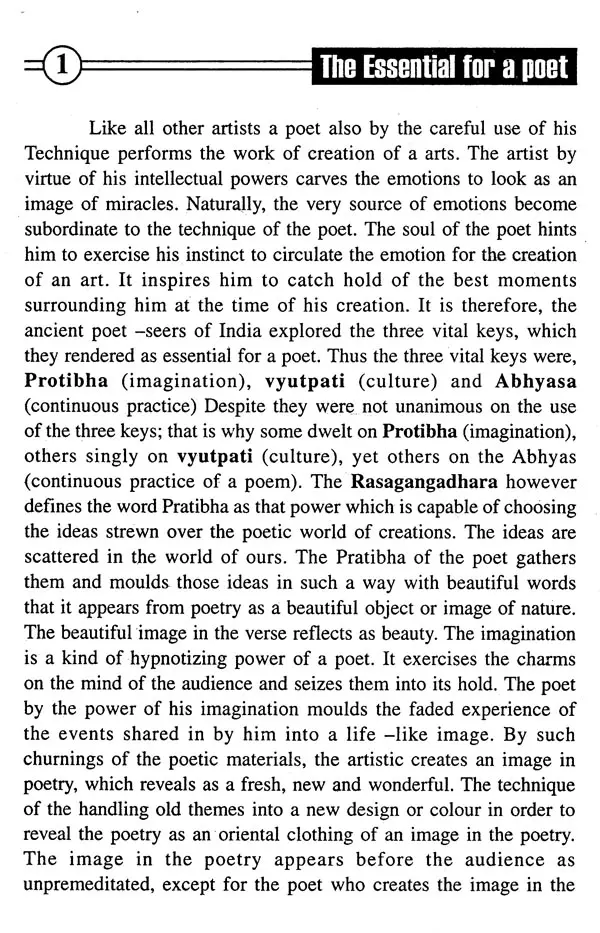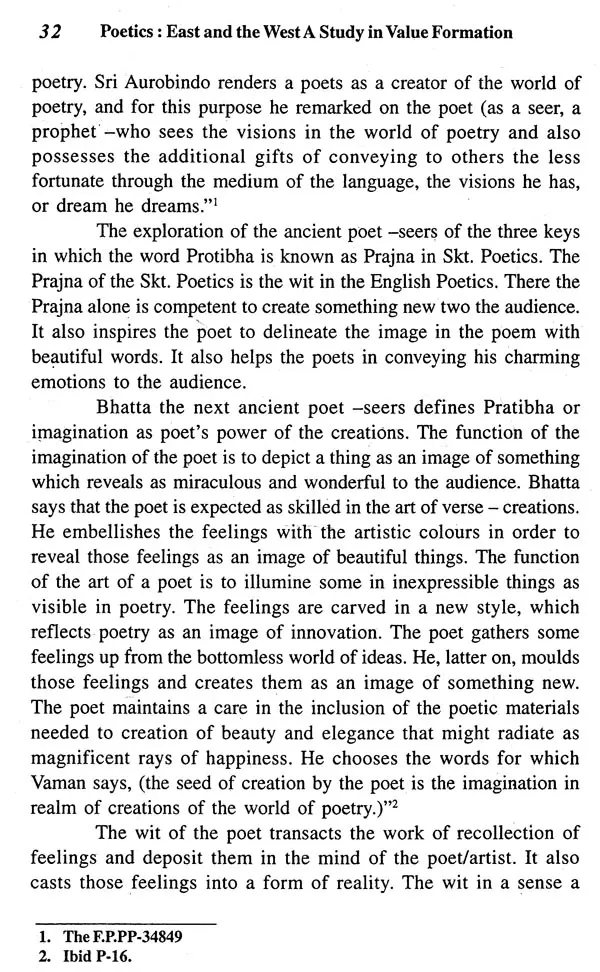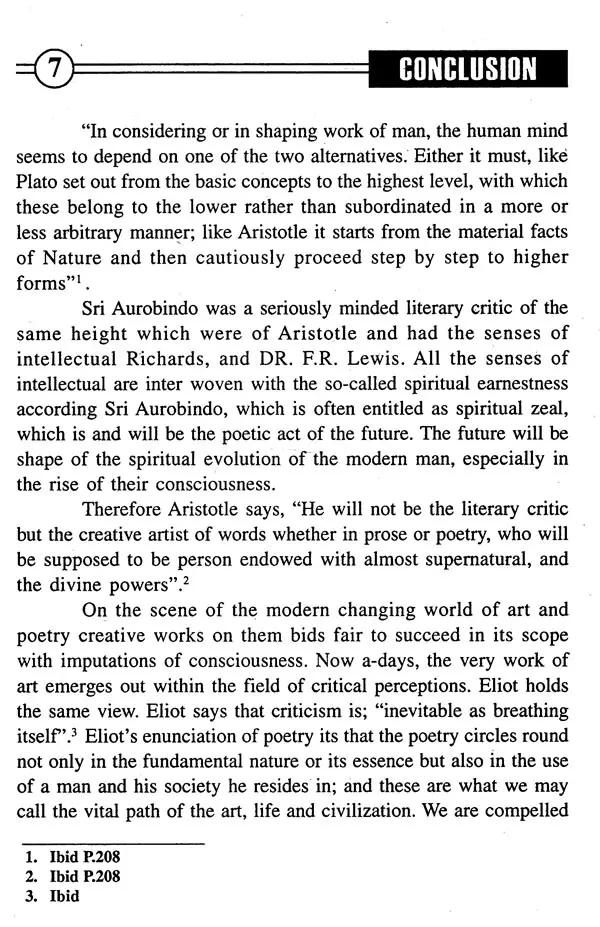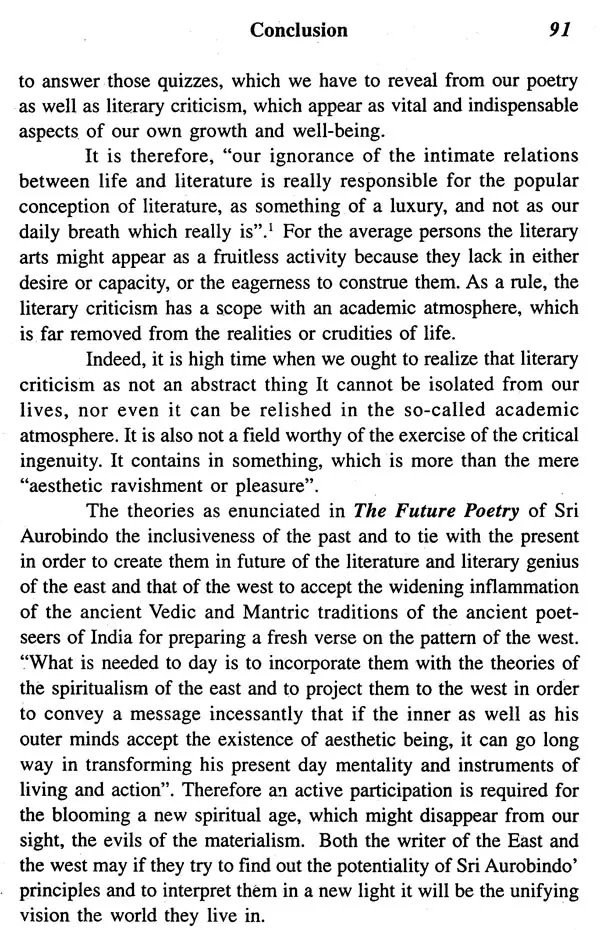
Poetics : East and the West (A Study in Value Formation)
Book Specification
| Item Code: | UAE666 |
| Author: | R. K. Mandal |
| Publisher: | KALA PRAKASHAN |
| Language: | English |
| Edition: | 2006 |
| ISBN: | 8187566183 |
| Pages: | 96 |
| Cover: | HARDCOVER |
| Other Details | 9.00 X 6.00 inch |
| Weight | 260 gm |
Book Description
The book virtually evaluates the East and the Western definitions of the epic-poetry and treats their striking similarities. It describes the central ethos required for the creations of epic-poetry and intimates that the creation will be the outcome of the lofty imagination of the poet which remains tied with the moral arguments for an object. It emphasizes the existence of the truth to the creations of the epic-poetry, which might either be the truth of the spirit or the truth of the probability of a thing. It presents an account of the origin of the epic-poetry of the west and explores the possibility of the creations of the mantric poetry. The spiritual epic is possible even in this modern age of science and scientific discovery on the basis of Sri Aurobindian exploration of the fact that the materialistic approach of the west is insufficient to solve the problem of the human unrest and, hence, it might be inoperative to the creations of the epic poetry at present. Moreover, it has equated the characteristics of the epic poetry of the east and the west and assessed them by fars close. It treats the love element in Savitri of Sri aurobindo and also predicts the creations of spirit as truth element in the epic, which would continue for all time to come. The book appears a sincere attempt of the author to enrich the 'treasure of Indo-English creations of literature, poetry and epic poetry. It by virtue of the comparative evaluation of the poetic principles of the Indian epic and of West has evaluated Rashimirathi of Dinkar as a fragmentary epic-poetry. It evidences Savitri as a spiritual epic of full stature.
It is at best an interpretation of the inscrutable issues in lucid words, which is helpful in the easy understanding of the readers. It illuminates a style very sophisticated in a efficient manner, as is expected from a teacher.
The Author Prof. R. K. Mandal took birth in 1945 at a village Adalpur, Madhubani, in the heredity of a teacher and gradually developed his drive towards study of the spiritualism. He Post graduated from the Bihar University and acquired Ph.D. Degree from L.N.M.U., Darbhanga.
He joined as a Lecturer of English in 1970 in K.S.D.S.U. Darbhanga. Presently, he is Prof. of English in K.S.D.S.U. He also assumed over the offices of the executives in K.S.D.S.U., Darbhanga and worked as a senator and member of Finance committee, a statutory body of the University. As a social worker, he took part in various programmes of social reformations staged time to time in villages, districts and state levels. After a wide study for more than two decades of the philosophy of Sri Aurobindo's Indo-English Literature and spiritualism, he authored Epic-poetry-its origin & characterization, Poetics. East & West : A study in value formation and the Integral View of Life.
It is a work of comparison of the two poetic principles, those of the east and the west, on the basis of the study of eminent scholars of like Aristotle I. A. Richards, T.S. Eliot,. Coleridge, Dryden, F.R. Leavis, E.M. Forster, Longinus, L.C. Kinghts, Frank Kermod, R.P. Blackmore, Lionel Trilling etc. The author has tried his level best to equate the theories of these scholars with the theories of the East, particularly those of Anand Vardhana, Pandit Raj Jagannath, and those by Sri Aurobindo, Compiled in his The Future Poetry.
The basic question is the evaluation of the poetic art or the effect of an aesthetic emotion of an art. The emotions drawn from the art are either emotions of ordinary life or of real life, in order to find out a substantive solution the author has based Aristotles Poetics. It depends on one's angle of vision, which he applies for the evaluation of a work of an art. The choice has normally two alternatives, either, it might be an assessment by a realistic vision or the review of the work of an art, or the poetry of this kind would relate to the straight forward emotions of pity, fear or erotic passion and all that. The other might be an angle of vision related to the artistic modification for the evaluation of a poetry. It might fetch the poetry to stage the nature of some distinctive changes in the real life of emotions. It is called the epistemological approach to the evolution of poetry. If we turn our eye a little way from it, we will have an option to evaluate the poetry which deals with something subjective or objective. For if, we call a poetry which, impresses upon anger and murder, it might well be concluded that the poetry won't be a kind of intensification of ideas, compounding of magnification of ideas indirect, mixed, with reconciliation of feelings.
The basic problem in the poetic world of creation is the lack of co-ordinations between theories. It ought to be a way to negotiate with the ideas, ancient and modern and the poetic systems of the past and present.
The function of poetry is to reveal the truth of coherence rather than the truth of correspondence Sir Philip Sidney says that a poet "nothing affirmeth and therefore nothing lieth". Similarly Aristotic Says, "After all, what is a fine lie, is poetry". Simply, that a fine lie bears with its own evidence in such a way that it might be believable to us as an object of reality.
A theory of poetic-art will not be able to get a long way in absence of at least two key terms as; to stand in partial opposition to each other, and to keep the thing safe from collapsing into tautology or into liberalism. At the same time, it will hardly be approved as a theory of creations unless it tries to bring out these two terms into a reconciled concept and establishes a necessary relation or sees each into the other and sees through each other"
The principle of the creation of poetry in English poetry or Indo-English poetry is so facto, depends on, or is related with the reconciliation of two critical terms, they are 'making and saying' and the latter terms saying is the conclusive of the word 'seeing' it is because, "Always the seer is the sayer". Therefore "making is the Aristotlian emphasis, whereas 'saying-seeing is the platonic and romantic".
Therefore, "Art or poetry is the creation of a particulars situation, where we see each member of each pair only in or through its opposites as making is possible through saying and saying through making"
We intend to imbue poetry either with the stamp emotion of reflecting an aesthetic pleasure of sensory pleasure. The aesthetic pleasure has two forms; "a non referential and platonic, a form of sensory intellectual pleasure (like wall Painting) paper and arabesques, terminals display again in its own way, and (b) referential or symbolic, the anti-platonic art or pleasure, is especially the pleasure of poetry. But this kind of aesthetic value drawn from the poetry is an unstable conceptions".
